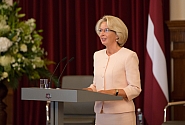
The Latvian-Russian Peace Treaty, signed a century ago on 11 August, marked a turning point in the relationship between the two countries, irreversibly establishing Latvia’s place in the European geopolitical area, emphasised Ināra Mūrniece, Speaker of the Saeima, in her address at the event held in Riga Castle commemorating the 100th anniversary of the Latvian-Russian Peace Treaty.
The Peace Treaty was an important, logical step after the founding of the Latvian state and the victory in the Latvian War of Independence. Soon thereafter, on 2 September 1920, the Treaty was unanimously ratified by the Constitutional Assembly of Latvia, noted Mūrniece. However, the optimistic expectations of the Constitutional Assembly about cooperation opportunities with Russia did not come to fruition, as the Soviet Union occupied Latvia twenty years later in gross violation of the Peace Treaty, expressed the Speaker. The widespread support of the international community for the non-recognition policy regarding the occupation of the Baltic States had a significant impact in those times, stressed Mūrniece.
“The task of our generation of politicians, diplomats, and the entire society is to remember our history and prevent the exoneration of crimes committed by totalitarian regimes. Unfortunately, the Russian Federation’s attempts at rewriting history in order to justify its current policy have become a trend. Russia has openly attempted to challenge the fact of Latvia’s occupation,” said Mūrniece.
The Speaker of the Saeima emphasised that it is the duty of the international community to advocate for the territorial integrity and sovereignty of Ukraine and Georgia and to closely follow the developments in Belarus, where people demand more democracy.
“Today, it is important to develop bilateral and multilateral relations with the Russian Federation with strict adherence to the rights enshrined in international treaties, respecting the sovereignty and territorial integrity of every country,” underlined Mūrniece.
Saeima Press Service







